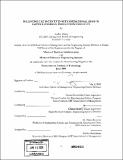Balancing tax incentives with operational risks in captive overseas production facilities
Author(s)
Chang, Audrey, M.B.A. Massachusetts Institute of Technology
DownloadFull printable version (21.36Mb)
Other Contributors
Leaders for Manufacturing Program.
Advisor
Donald Rosenfield and Daniel Whitney.
Terms of use
Metadata
Show full item recordAbstract
Due to the general macroeconomic downturn, many companies have turned to offshoring - sending a function overseas - to reduce production costs. While some companies elect to outsource overseas production to outside companies, many companies choose to keep production in-house and therefore create captive production facilities overseas. In many countries, the government will provide financial incentives (e.g. tax breaks, loans, subsidies) to certain companies in exchange for creating employment opportunities and industry knowledge within their borders. These financial incentives may tempt companies to shift more and more functions overseas; however, in many cases, there are significant operational risks involved with shifting functions overseas. This thesis uses a six-month project as a case study for discussing ways to weigh financial benefits against operational risks. The project was conducted at the European headquarters of Spirit AeroSystems, the largest independent designer and manufacturer of independent aerostructures for the commercial aircraft industry. Spirit Europe recently launched a greenfield factory in Malaysia. Malaysia was selected as the factory site for a variety of reasons; among which was a long term tax incentive. This thesis describes the process and tools used to select an optimal transfer pricing relationship (i.e. scope of work to be performed overseas) and transaction methodology that would best monetize the long-term tax incentive without incurring unacceptable levels of operational risk. (cont.) A comprehensive functional analysis was conducted to understand operational risk and economic value. Next, a Monte Carlo simulation was created to better understand project profitability. The results from the functional analysis and the Monte Carlo simulation are united to identify the optimal transfer pricing structure and methodology. The unintuitive result is that, for both operational and financial reasons, the scope of work transferred to the low tax jurisdiction (in this case, Spirit Malaysia) should be fairly limited for existing contracts.
Description
Thesis (M.B.A.)--Massachusetts Institute of Technology, Sloan School of Management; and, (S.M.)--Massachusetts Institute of Technology, Engineering Systems Division; in conjunction with the Leaders for Manufacturing Program at MIT, 2009. Includes bibliographical references (p. 92-94).
Date issued
2009Department
Leaders for Manufacturing Program at MIT; Massachusetts Institute of Technology. Engineering Systems Division; Sloan School of ManagementPublisher
Massachusetts Institute of Technology
Keywords
Sloan School of Management., Engineering Systems Division., Leaders for Manufacturing Program.